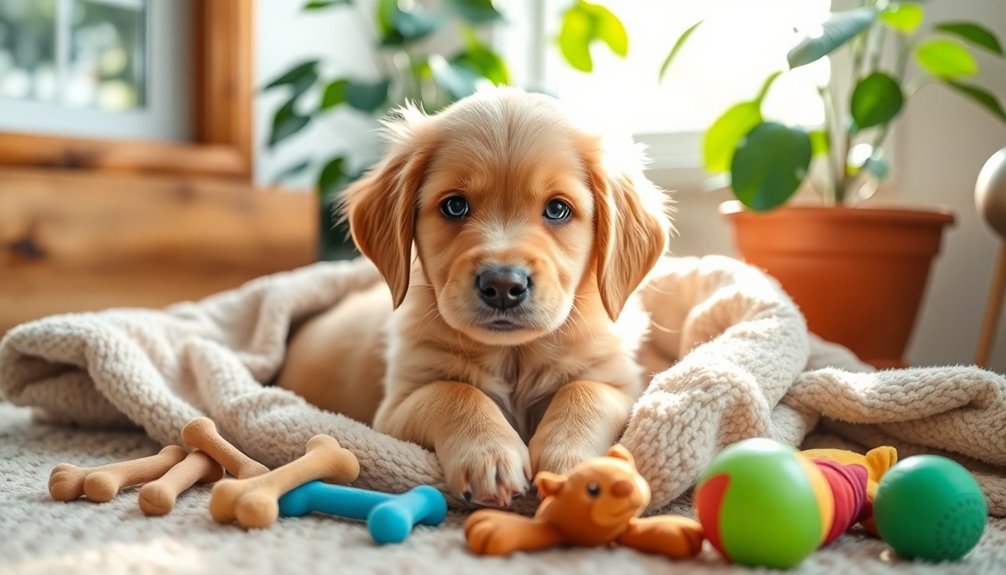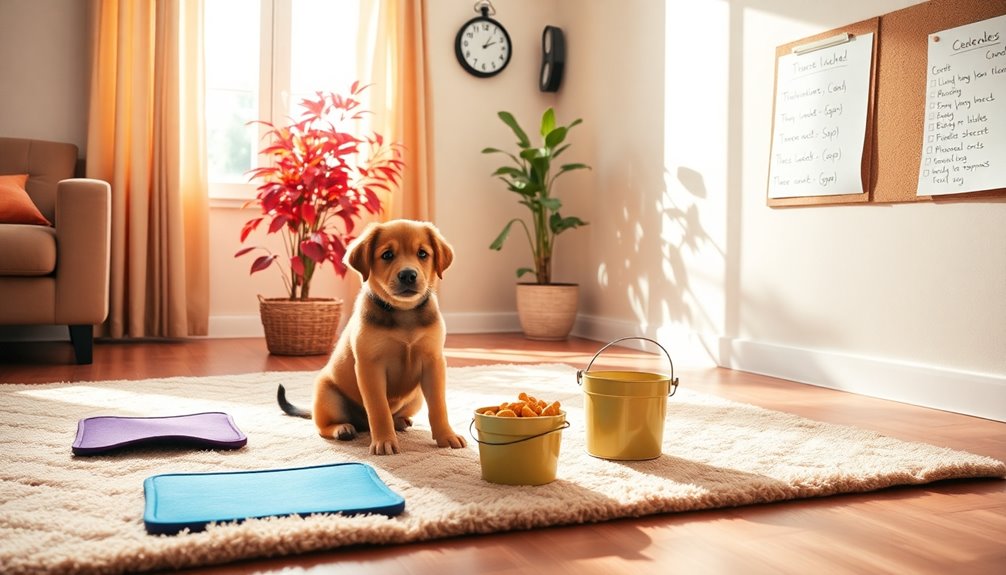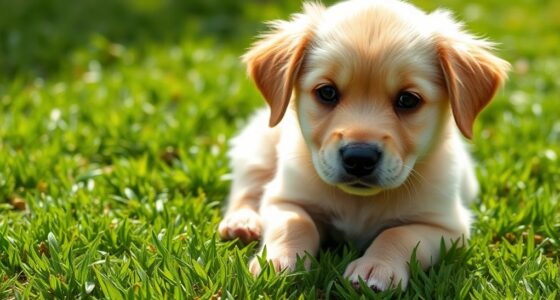When you bring home a new puppy, you'll want to prepare thoroughly. Create a safe space and gather essentials like food dishes, a comfy bed, and engaging toys. Start training early, focusing on socialization and positive reinforcement to build good habits. Keep a regular routine for feeding and playtime to help your puppy adjust. Don't forget routine vet check-ups for health monitoring, and make time for exercise to prevent behavioral issues. With the right approach, you'll build a strong bond and address challenges as they arise. Discover more tips and insights for a happy, healthy puppy journey ahead!
Key Takeaways
- Create a safe environment with essential supplies like food/water dishes, a dog bed, and engaging toys for your new puppy.
- Establish a consistent daily routine for feeding, potty breaks, and playtime to set clear expectations.
- Begin socialization immediately to reduce anxiety and foster positive relationships with people and other pets.
- Utilize positive reinforcement techniques, such as treats and praise, to encourage good behavior and learning.
- Schedule regular veterinary check-ups to ensure your puppy's health and receive proper vaccinations and preventative care.
Preparing for a New Puppy
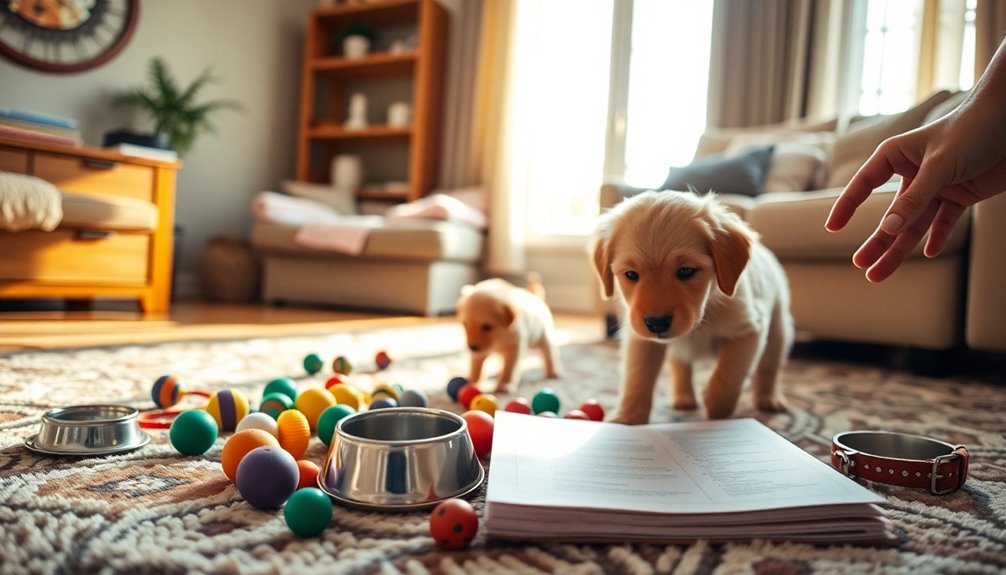
When you're getting ready to welcome a new puppy into your home, it's essential to create a safe and comfortable environment.
Start by gathering necessary supplies like food and water dishes, a cozy dog bed, and engaging toys to keep your puppy entertained. Choosing a puppy-specific food that meets AAACO approval guarantees your new friend receives proper nutrition during those critical growth stages.
A larger crate with a divider is a smart choice; it provides a secure retreat while accommodating your puppy's growth. This crate will be their safe space, helping them feel at ease during the shift to their new home.
Establishing a consistent daily routine for feeding, playtime, and potty breaks is important, as it helps your puppy adjust and understand their environment.
To ease anxiety, consider using familiar scents, such as a towel or clothing item from their mother. This small touch can provide immense comfort as your puppy navigates their new surroundings.
Essential Training Techniques
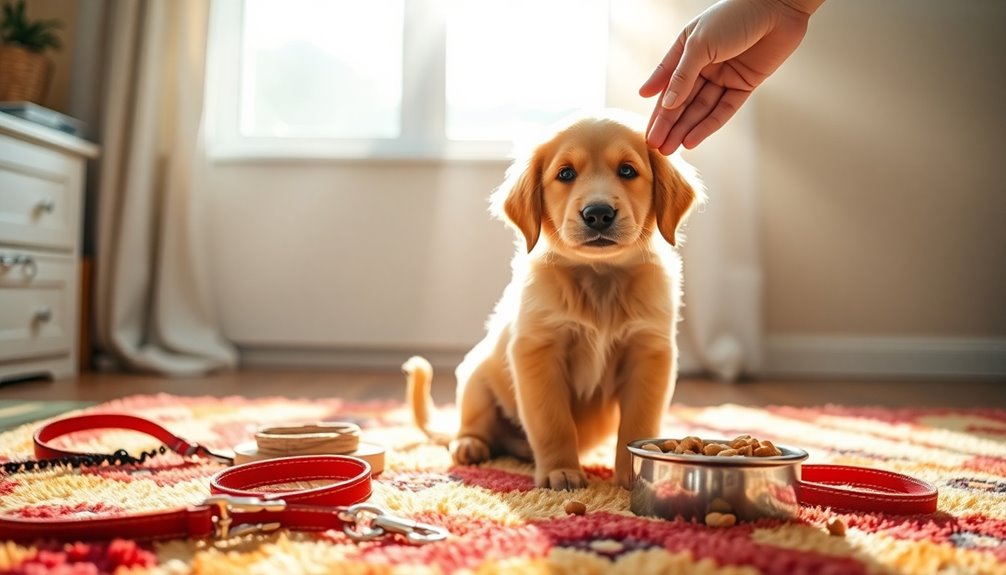
Creating a nurturing environment for your new puppy naturally leads to the need for effective training techniques. Early training is essential, as those first few weeks set the foundation for good behavior and a positive human-dog relationship.
Start by establishing a routine for feeding, potty breaks, and playtime; this consistency helps your puppy understand expectations, promoting better behavior over time.
Socialization should begin immediately upon bringing your puppy home. Exposing them to new experiences, people, and other animals reduces anxiety and helps them adapt to their surroundings.
Use positive reinforcement to encourage desired behaviors; rewarding your puppy with treats or praise makes learning more enjoyable and effective.
Address common challenges like biting and chewing through early training techniques. Redirecting these behaviors can prevent destructive habits and guarantee a harmonious living environment.
Incorporating safe treats like cilantro for dogs can also enhance training sessions and provide additional health benefits.
Remember, patience and consistency are key. By investing time in early training and socialization, you'll not only set your puppy up for success but also strengthen your bond.
Embrace this exciting journey, and watch your puppy flourish as they learn the ropes of their new world!
Building Positive Relationships
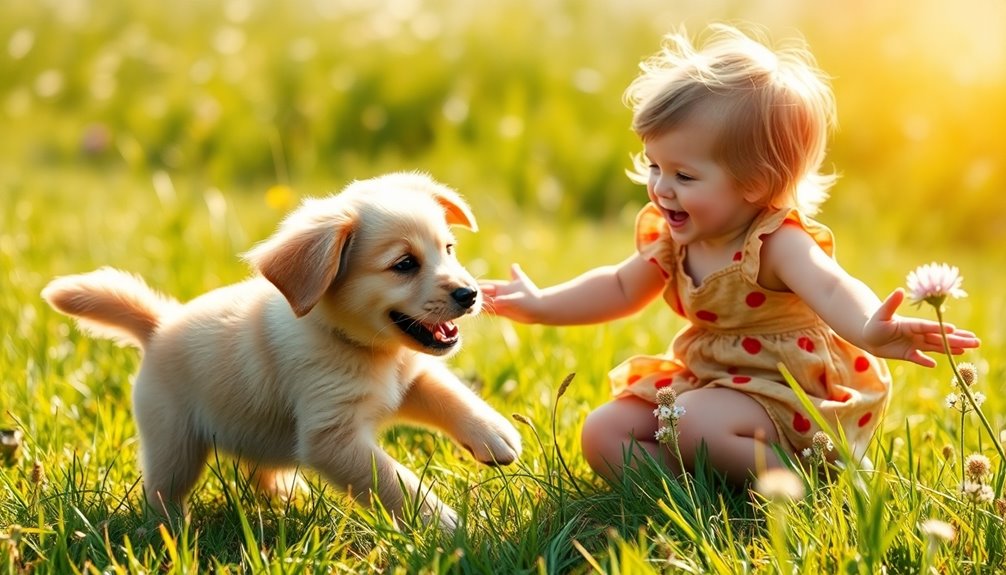
Building a positive relationship with your puppy is essential for a happy and healthy companionship. Start socialization immediately after bringing your puppy home. Expose them to new people and animals to foster a positive bond and reduce anxiety. Use verbal praise and treats during these explorations to encourage your puppy to learn boundaries while reinforcing good behavior with kindness.
Establishing daily routines for exercise and engagement helps your puppy feel secure and understand household expectations. This structured environment is vital for their development, allowing them to thrive. Consistently reinforce good behavior during the adjustment period to build trust between you and your puppy, strengthening your relationship over time.
If you're looking for a more personalized approach, consider puppy boot camps. These training solutions can enhance socialization and help you establish a solid bond with your new puppy. Additionally, incorporating educational toys into playtime can stimulate cognitive growth and promote positive interactions.
Through consistent engagement and positive reinforcement, you'll create an atmosphere where your puppy feels safe and loved, setting the stage for a lifelong friendship. Remember, the more effort you put into building this relationship, the more rewarding your companionship will be!
Health and Wellness Tips
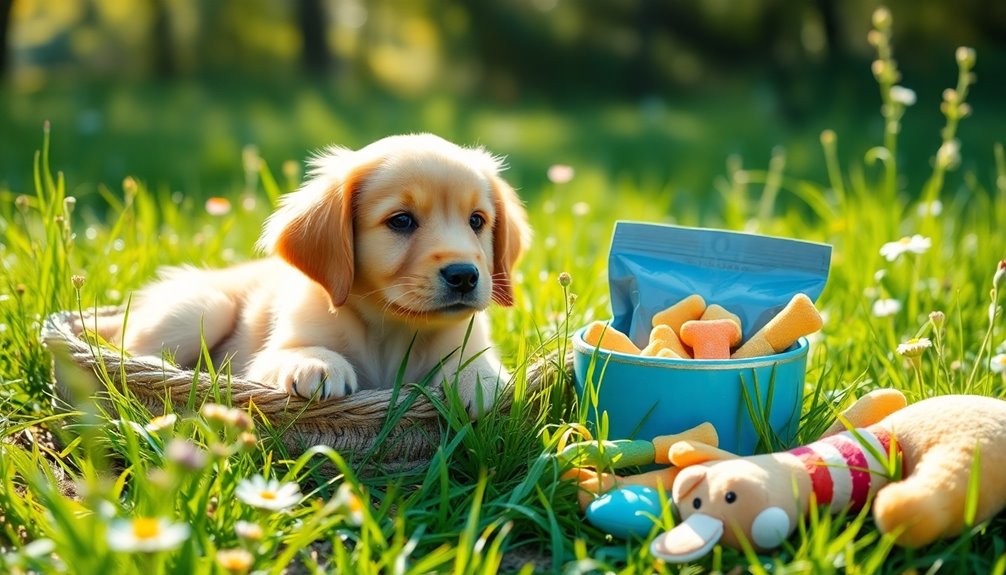
A strong bond with your puppy naturally leads to a focus on their health and wellness. Establishing a regular veterinary check-up schedule is essential for maintaining their health, including vaccinations and preventative care. These visits guarantee your puppy receives the necessary shots that protect them from diseases.
A balanced diet tailored to your puppy's specific needs supports healthy growth and development. Consult with your vet and choose a diet approved by AAACO to provide the fundamental nutrients they need.
Socialization is equally important. Exposing your puppy to other pets and people helps reduce anxiety and encourages positive behavior as they grow.
Regular exercise is critical too; structured playtime and walks keep them physically healthy and prevent obesity.
Don't forget to monitor your puppy for any signs of illness or distress. Changes in appetite or energy levels can indicate health issues that require early intervention.
By focusing on these aspects—diet, exercise, socialization, and regular monitoring—you'll set your puppy up for a lifetime of good health and positive behavior.
Prioritize their health and wellness, and you'll enjoy many happy years together.
Managing Common Challenges
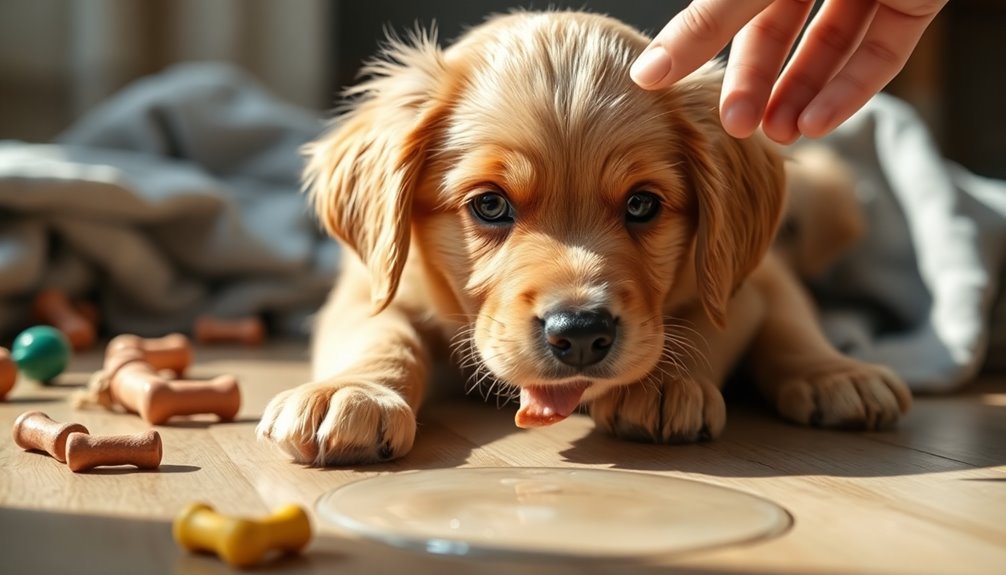
Steering through the early days with your puppy can be a rewarding yet challenging experience. You'll likely encounter behavioral challenges such as barking, biting, and chewing. Early training is essential to address these behaviors effectively. Start by establishing a structured schedule for feeding, potty breaks, and playtime. This routine will help you manage your puppy's daily needs and minimize misunderstandings.
Socializing your puppy immediately upon arrival is vital. It helps them become comfortable in their new environment, reducing anxiety and making it easier to handle their behavior over time. Take them out to meet other dogs and people, ensuring these encounters are positive.
Utilize positive reinforcement techniques, like treats and verbal praise, to teach your puppy what's expected. When they bark excessively or bite during play, redirect their behavior and reward them when they respond appropriately.
Consistent training in the first few weeks lays a solid foundation for good behavior, making your life—and theirs—much easier. Remember, patience and consistency are key. With the right approach, you'll soon see your puppy thriving and becoming the well-behaved companion you envisioned.
Frequently Asked Questions
What Is the 10 Minute Rule for Puppies?
The 10 Minute Rule for puppies suggests they can hold their bladder for about one hour for each month of age.
For instance, if your puppy's three months old, it can typically wait around three hours.
To avoid accidents, take them out every 30 to 60 minutes, especially when they're younger.
Watch for signs like sniffing or whining, as these indicate they need to go outside, helping reinforce good potty habits.
What Is the Puppy 1/2 Rule?
You know that feeling when you're bursting to go? Well, your puppy's got a similar situation!
The Puppy 1/2 Rule states that your furry friend can hold their bladder for about one hour for each month of their age.
So, if your pup's three months old, take them out every three hours.
This rule creates a consistent potty schedule, making life easier for both of you during those early, challenging training days.
What Do You Need for a Puppy Checklist?
To prepare for your new puppy, you'll need a checklist of essential supplies.
Start with food and water bowls, a comfortable dog bed, and puppy-approved food.
Don't forget toys for playtime and a crate for training that can grow with your puppy.
Establish a daily routine for feeding and potty breaks.
Create a safe environment, and schedule initial veterinary visits for vaccinations.
With these items ready, you'll help your puppy adapt smoothly.
At What Age Do Puppies Start Obeying?
Imagine your puppy's first day at obedience school, ready to impress!
Puppies typically start to obey commands around 7 to 8 weeks old. At this age, they're developing their cognitive skills and can learn basic commands like "sit" and "stay."
Consistent training using positive reinforcement will make learning fun for them.
By 12 to 16 weeks, they'll grasp these commands even better, setting a solid foundation for future training.
Keep it engaging!
Conclusion
So, you thought bringing a puppy home would be all cuddles and wagging tails, didn't you? Surprise! It's a whirlwind of training, socializing, and health checks. But hey, that's what makes it all worthwhile! As you navigate the joys and challenges of puppy parenthood, remember—every chew shoe and midnight bark is just a step towards an incredible bond. Embrace the chaos; it's the messy moments that turn into the best stories. You've got this!

